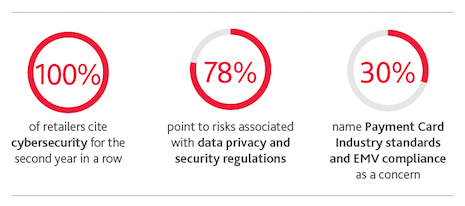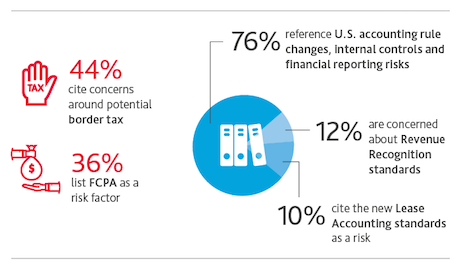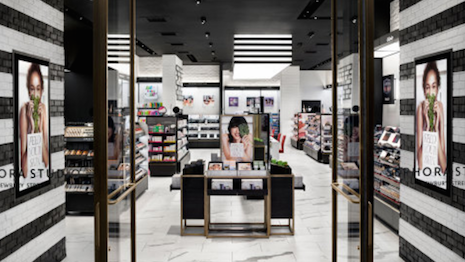Geopolitical changes and turmoil represent a few of the top concerns for retailers in the United States, and luxury retailers will be especially affected by them due to their global nature.
According to a report from BDO, some of the biggest concerns that retailers have right now include security breaches and the general state of the economy. For luxury retailers, which rely on a global audience, the risks of geopolitical turmoil are even more prominent.
"The retail industry is cashless more often than not, especially in the luxury space," said Jennifer Valdivia, partner in consumer business practice at BDO, New York. "The increased dependency on credit cards and cloud-based payment services open up new attack vectors for hackers to exploit.
"The luxury segment is a prime target, with a treasure trove of personally identifiable information from wealthy clientele. The repercussions of a breach are not just about data: A cyberattack may also result in a loss of customer loyalty—something this sector cannot afford to lose."
Retail risks
The modern retail landscape is fraught with challenges. From disruptive technology and regulations that business owners deem restrictive to legal problems and the difficulties of running a cross-border company, retailers are constantly negotiating new threats to their business models.
BDO wanted to figure out exactly which obstacles retailers were the most concerned about and created the 2017 BDO Retail Risk Report.
The report surveyed 100 top U.S. retailers and asked them to rank some of the problems that they see as the biggest risk to their business at the moment.
Among the top 10 were legal and litigation problems, implementing complex IT and tech platforms and dealing with suppliers and vendors.

Retail risks. Image credit: BDO
One topic that stood out was the risk of geopolitical shakeups and natural disasters.
As climate change continues to create erratic weather, coastal regions will be more prone to storms and flooding, presenting potential problems for retailers in and out of the luxury industry.
Terrorist attacks or other violent conflicts can also shape the retail industry, making it harder to get products in and out of an area or discourage new customers from visiting affected areas.
Geopolitical conflicts such as the one currently unfolding in Qatar also present major obstacles for retail success.
Political trouble
The ongoing diplomatic crisis between Qatar and several of its neighboring countries has not been resolved, and further blockades and tensions are beginning to drag countries from Europe into the mix as well.
Both Qatar and Saudi Arabia, the latter considered to be leading the blockade of the former, have numerous diplomatic and financial ties to countries in Europe. As the diplomatic blockade continues, those countries and their respective luxury travel and hospitality markets will have some serious decisions to make (see story).
Natural disasters also represent a significant fear for major retailers.

Retail risks. Image credit: BDO
The long-term effects of climate change are still being mapped out by climate scientists around the world, but some of those effects have already been nailed down and they will impact the luxury industry in a major way.
The most obvious is that temperatures will increase. Colder areas will benefit in the short-term, increasing the length of time in which crops can be planted and harvested, which will be a benefit for luxury vineyards in colder areas (see story).
Outside of these concerns, BDO’s report shows that the luxury retail industry is aware of and preparing for a number of risks in the coming years. Being aware of those risks and preparing accordingly will be key to handling them successfully.
"Now more than ever, cybersecurity requires a 360-degree view when evaluating needs," Ms. Valdivia said. "This means taking look at technology, evolving data privacy laws and cyber risk insurance.
"Keep in mind that every business is different—each retailer operates independently from another. Identify your company’s areas of cyber-risk and vulnerability, then develop programs to minimize the impact of an attack."
{"ct":"5zyrlvHVKbFl73N4MT2Vg5hCjgtacKFBeR\/HQPFblPIQHxWqMU0EttByJH3UsIKvKgKRnCs1dWuXMyRS+VZg06e3fy9JRoxJ69ht4bGPMvmJ5PN4aUTlvlji0R8Z\/SaranZQEJpcuxBH3eC7kTqOBcddXEYUTyDZTOrTTz0cdYGFhbkaUbcxfyt5HRp8RsnyQqy6eif1mY6AoPOBzlr0lNjm7rS\/iilrIfXPqrPFJMAX8xuUaBL6r78Tv0e4dCjnnAV\/ArVC2EEqCjtekpdyZx2zQuKVWWxwTc1wl6Mq3SeL5Wmu4SwTeDY+M4woTvBF7ImiJSskU1TfucuRhusufi7HLR60BiRdy2c2BgNosLMrVMU+yzkz6yxD+K0q9C\/ObAQBatcjDn3dWOKVuoIaxAfTRIn0bXuCZe5QODjjs3oV6JwMVSLEzI7BvpCExCvuNQD6MwIUZUaSjV8F56PZ6JW+jdeI87Q3nWQEErmUZW+4NnMWwhZTR2WGLLhYsGj\/hqR7MXJYR5ifBy+ZkV4RpLWrOPLeXS3fJWkw0KOyOa6LweLAgJJNBMzucXuhFk3AEUa\/Uiatmr0ueAWPCfVXj46VjPrmWo4irG6k\/i2H4GSptYKKjrRtACQMcbqiGkLo4YYKXufXBiQHn+cmvqVptbgR8Gm8Zff3q1Q9t7+UucSiVPXjWY6wJS5TpC22lMpFK73FMciwtHJwemat9PJlCNEElsFDWtdeXu7c6EP54IjR6ZG8XtYFu78c8H2EgEx0xuBb3iqP3dDxoW\/e4jsY2VgQaDwsXIcOZgPbJnetDX9tZAnbI5GZFD1w7IWK8afZcP3upCQHwyuYX\/qFkC5GrkCIhvJDKubDEmHjTdeQfJgRKu3M\/RE1PwM5vottIez7l7vmrwPuCa5M0u9GJ4mctgBNwDyv8\/eeROwghLG0PtDnvAYb9SIDKka2WWrxC\/HC2FuVzSLEhNFf+oPcqirHriLOEp40vtIPB2LRA6uSBqV3P\/YeX1VyRoTvHNK4m\/25++t5pSjS5n0MW9QVbiLX1DSOWtQHoeC7C1VYIc4WJres8BZu2dyaV3lvMUPYcXchkcOZnm9ki55jCGdYUzEZNJEQeg\/k7c6evT6suEbTZAT3\/E0YDlDMjQ6A6oj+SkeEqBvuzH3kmSTsbVeXtj295jZinEagYwNcAQEbOUF8qusi64a08b3zPuc7pURX4d6uNAS0oz5v+XgsSRPqchQkYUFA7f3SaFu6ZbwXWL236r+NC+63I4iOCon34OhgCWeONAvBKwhMppO\/yymwYofQyxt6p54fhEjdHKdoWGRn9oqldhHa29jGjW5GgHaXjlRZtqT4WTuCXhP7kcS5wJBRpcSSL7WIluHlv3YnxOZdIONsTIt9dw57a0KyGpb6eDMp88GawjdVdId\/iBndLAiaf12JGX6DbLUztDb5HlEKO0k\/f+mNvJFJ0qkoAoXjpsJWbYBRqvfS7sAbCfipAUpF7smv0gGqTz3\/ep9cpbU92PS+iCmr6LvYvoSStVgbNOrOum3lRSAFix6FZtryd\/ZIF0FZjJi7Km\/7Jemhn7hAjWw8rrAdfjNrtxb8P+6PQLe9QZ8UhLHDcy9GlMC6hoArPuhSuJicpGYROrKqOM1qh+Snk3bN7Sr\/X2nuZ4hyBG9tG5AhioQdYODurj9YC94TfE7UVYhY5rakG53eLddefRM9nb+oEcpoDw1+xSyXlrBUZgXFFGqYJ+h7MdDQP4\/8PDcVS27i8MJtvDQN57VD6yOz+A5ydnwwt8yfpHg53EB6aNTtFmLNItegDw2zmCw1pDoyVbkPLtw1EMXio7m0S5txyPP2BvBEA09MAHZS+6pxHGeUOyaUBBzSxEI3sjeMyh0n2ydwH80ERtSaJNE6uvVTYJKsstdj4ZWjN\/BL4ih8VzRMRqiCBJHg+1wswX22USeeXhCWd7rmcijHEjvvh8AxYyG77KMSfpVHjfRuJ81BrmGqUdyuYvfcvp6XBW0UWCfjO+0yhUAJu4xpGispUcL8Ig+hq1IYR9vchBI5eBaEV3NfhGpLDZKSQ0kHXvyGEbYGFzi\/FE8lpKi37uCImPP1pl\/WkBkrQ+CJWMfCo8FYUN1LVDiwbnWDRT8ecHiz4oV6wsleYP\/DKGa7Rcv0sGy6jFS2d2FnHPP0tILRjPPaf4f7V6VijqL1Ktp\/z\/DapgpWaihZ7VF9k4X\/3pzvuuJOcF+U6QuciTs6xhB9mm4i8sNJ0ci3O8sMxqS4jgPmYFbdWnqzcb16O7dNdCvZ+s8Bg6VQ4HCm3hIwsk6ya3groeAREi0vYJwNuCy4IJ4isCo4LMJujBqzDrhNoViGMGMioyomUJ1Stx\/QJP+rIST2222nfwGLDVS\/NIxd4mdAoRxxDb3rvqEfDpuCDGX48wJ1RxnrZxFwpCkKQi5MF9v6fykyBbhWfnplehB8Iit2zEgw5bmeaceD26z5u09MwtikhiIPXJW5IBvno+9GbG7k81zMrd6vgyDO4AXW5RXPk6fjZ75Ud685PzsWsteuJPJxDGLpH0EEL722gBAF1O7fcucNs5E+KvkgNJK1nBIEzEnmHTfnCSncUihG4sQ9IzugHrvp8lRnHHPK2loEYQi25rOJB8IBqy9vlO7laaZlN1oKdcShYpx4hNhwERK+8XmYuXi+bmMk13fLG+Ay2hQpcoPYCh2FC1VmwGARPgN3AO0WSrrZDFi2NjHiCjdz1OSi4p2G11zOprl4kA\/NKFiKByXk1hP8iyzl7jE2Q7Cpf39RJL\/Px+YeptNdxcP7bn2CItxxulQmX8GqEeriBzWkodUJrThQpv4LSZTxBogLAUJq9OOjqKOnKd8XVENPwSK6YPMZ64YITW9qc9IZUwpIy2Y3dYEtxzMFJRsvSzccwAYyj6g1WeWQNRsU69aNYoU8uS4PdS+L42pQKN5JGDbYtCom5upO6Y+FM++3CDVtrhPAl2RAWNRotXvlfpW21OOM1+mW4ns3N6ql9S1HoEBFRyHagw+V+BDsX8oMaAo4bYJv9vP30b5pW9\/exw71lQeunDvYCT83wOif00zij+KcFpKBHRfS1q84KGUSbpzDYv1bqv0dVbuOsFUiScz8P2DaIfqGaHM6A5TjiFNlFsDgdw7bup7NPtPdCQxrJPLuId6wMPNNnglPGe49GSFQzk399p\/VakcvO6zBwD2MlV0v+i1EYRZFrm1kfkero\/oSFZQk441LQ5PnQR24GicFtwW9tHP7gDla7+3heWp+hVSDW4eJYkaunTluLakHSofcOcYwycQvfwed70eiuKBQoAPD75FrP0I7xSN8TixhfftD3zWZh3vkYd1XxbFiKI+yRmOMMsItb7gWKz26T3+os5yMzJcdu4k4siT1JjIkDyb3itiD0AsZi56OjQ6kPhEDCDvCXtJ0q5qNt2HF\/6AbBv983fCpafryH\/X8z1P3ortWIrjjUfQf1K3JS1LuCveIZp1NL9mkxAye9uM91FJineTmj7mvAZhXio+e8h13hsAY\/kPz0a8KftccpHKl2wHi5VhbPfPwl7qOM3Y3Z67\/uJyyrFsD0EeY6UJXR+v1Kn39TSQVzlbVuGS2Y7wsw1AjWkbiWnDWAcV1AG9ENj4XWwHKD0FBQ49vC+ZShruJERRWLZnJksWhBcwZeN6sDyQs46HpHWJjwuBIYNXpQ5XSKNtl5IQNIcDXfRU8d2q5C4hXFgp6Kmoy1jGV5h048fvn79ujppxK9ZT8fYghreVxeDlTuVpL3cDnrqmKLHb71ejpYNt9woskhnwg2kkj7hqlEZ+ZoaxxxmzA2GYVyfXJpOcOUttVJlzPwOUgi2pT8t2I3ugXAxfuZfA2hh82OWLyCfLfNwF+8w8A+5xxTdt3nWobNKmmlKuEa340Fx6ON2pNgG4Kp4u3Y6YawkEJrHyqt+lhxNPYzusQPaZ0rcwznGVb9MVuTLJ2Oys22A2ypqicf736DD4C1NqQndNlJzlgg8Tw4RccipEYL7TIByrSPXPdXeotkmxu1BYG5Oj2nfW0XrFsP4l2ZBsOqfS4+M9EOgsAA72+DEUO47GOYkNh3qHJ92lHpScpBbWTOUIicPDjpsew0sPKbW3un9xDlMi+bGKg6qusY+esFfVXYpZ71GxHIwzE2Ni9BN+JdW6IqOnG48N2qwX3M3OQjnMbx12H1co9EEb+PsIxyfGrE+k0+QsF9cyRi7ajU3MCsvxw0VfTB0pQPviN60VHYfcJSCN6XXd73j\/gAksgHNt0PkwNIp3HWDjbAcIGeh2hEhAtoo3lpxC565G3WcU7E\/cPReBwLY3oJ2GWz4V6TS8yMtW9vyufyw44dN4U4EpBHSGTZCevKwB4hhLk3MZFChEjOh1kz4RP2tqSjA0d3yWcrowmBZZmoUYyN2TOpg5LnxorWk59x2ZYZ18qttFeKzIcQSJ99P9B\/y+XO1OruhTa\/U\/7X9R8wNrHuzZ\/dT23sRoMnOJEveZM64KbEA0xCimZb4X05lPUvmgWEWaRZxiDGgBYbDJPKqrjUT6KgILI5p4cn0O9PM6e8tRMxJ\/z9TSDpliCkwoNbC4inuABQ8+FgmADkZxVJzY1qO7CVPl630SxGX4USZN0u46Skdl0XQCsP9kI9lzpppWme2UJ6\/TY2i6bbg4sxn5dBgDuwUTXkv9gfcStuMQycf4DfZPEn54zekolAiMmYmRTzf2S6QnEuQWdVAw81e7W6GmAFClbRNvVIwfpcW4k3cJLq0Xrn3L24kRhZHcnOXakLo8Yj4538gkZ7lYSnPSMwTnNgbHIA4N\/k4aY+arpbmZw65QCL3ZZXg6RqR03AFqxyTqIsa+RR5pX1OEvw9Loi3CPcwMtv5kF3cJLLmuc1pTzY0+TzqlQuE0d2dug0D5DlrujxAyoXMQ+VdhvNDcJ4N0J9u3iIpP69VAlJ1K2hGyY3lIHI0pQ4hKBiURGufdBWjEk68ZBFQ3i+24c+qSyOJpfNb2ESL5G+IuNkZ+mSzE1YTQ9AGN+kgscvWSPixGQ2rKBL9Zmwiiqvj7jY2CsGXLl2uuixHWb1W3jX3c16t9NbA9KI9C0HXLrXRmdBtC9ZZsMfvllZwcqD+f6PvuLxxldDtJw4Z54CiWvSuEqz7bwfOKqCyfbkm0vnLzc1XoVY0a5n0i0yD8JrrWcHLXuXDznYJNlSKlPbuKVF2wUhdmlox24pvWZrdsq\/AXfQ3LBVwcYiWrNQ+mimjxOx\/qpHTBSkKJkNr2jrA88d8xWU\/Rvq3LcrT\/Ad3bgp30ySsCiokoZex5dGaWD\/fPMBU4SV2uCRAXKJUqcmKClFCKPsvq23fVfTyXObkjBSGvAFTqzbeIUEfNKIiDNKh\/vpktGOP9d3Oi6Y3nJlC9yp79k2dpIyW0KbAKTu4uhg3B0ZmJJK3IHDDz3bmvftHz6ANbJSqArjWETPF5M9qN0K\/3mNn8d1sqdkZUjDlfWN6n7p+00KFfPWryKmWss\/ehKSzGlG68Cyy1fzL5nHs\/Cq6Ax6qqKK\/SXL+5xZ41zXlX3MWnvjtSzJQDNzLGo40GEZPyZY3PnrfsoMgydnY19MASLm1k01gD9gXKNc9SLyMaxh5oMo\/sKK\/TEwcHsCXJLD8yr5Cve2ST0FQBYDGTRGmA1oSnTFQOalRbAnIJf9HXa+VvxDPsozzaaFKCCCdYGlGb1nhri4RYwptZBUEFVYaayzQeWw29\/ppvcXkAgj4Vvb7yaNJLK5x5J7WFnTqWKDaC1VmiYJ48jBh1BVvdBg98TH7AxUI8TI1ZzpFd6JdVNeAU9nu8j3izFWr7dlR2P7+Rn6u2\/YZgmnqrEwglrwDNB4kVEZVZA5fwFthiXBUSKiC3bSONK+jKT30aVjVx32J8OxGsuHWJVYduvsGS4DaUWS11b8P1lLVsEpT0iNv4ZOy1M8x7ImGGt16U24W4gASZIvAnfJBvvKG07DzRw1dk+xBkpS+9IJLSNbSdFNkKhqnQtg2cfP62xrk1AcgEztt9S3QJJ1OCjauDixMeg3vKEWt8MqGoCETYdPCPj9Plp\/FXOf\/QCW9c229Qys0O38SRmolLzuLtVjyDmRrn+BlzPCU801O2xCFtZwgqffm0oOdkoZhEXyo48lK+ovEmMMuNw1cxBSigFsOSJ4jGu6Hd6GiHhsk5anwMupgjvfCuj+a+EdT5NfkuDC6bEi6keYrA8OyMFEa5ou+7jfUqjLUI8eliMkVlG8PoS1wsWFRsFB2ZSRpJ+ImeN5sfz+xl\/6vTyL0joKmWoTYlvBM9dSTKQSyMrHU9EiyM6W\/emH\/7KBJRgLT335nbJU0mztS9rGzizgXLfCh0xlfCA3HyQ\/iqBb3X4Es0DLVi83KpQvmj91cUSiFehDpz7Mxx5NRgLwOyn4kmYpYFfFyVqCiQBMilJnM0VTTJiNudGhcb4yq4FTlRPG9z23fv8XEyXLbb8No0qtAmt3DUlllV71rZqIaRdTfkBkzpw4HZZVWNPy5VvS427K24LzSqr+RgM+13eiUBTPKzmz2L1nQ5RWf1\/7clrzDAkIYSRb0HnPFQ2zoGisbDDW5ksna3dQGZidAB5kMrs+2\/Sg1awuhMwddL1hgMuc5AUQW291LCyvWLSpI2XKGngz6fz3U2Mv2Bnufv95H2gmXQvPJoFytTHa9PB5UQgywZlrHTBv162WFiMB40VmQDPxNc9j\/cNPnGILocqPrnMKAAe2o32cfrqiJQzTMFrqroHxURSrKg4iOzpl1fOIqRmZNGVv2MYAxNO\/JxJgf6uLIHLLKuNP5i3jCUkAh\/zfsY4Kejtp2aJSwSGwYIQSqJG7gNQs3CbpVXA994w+O\/pfcDYGftMoK9gt3REuh4e6ET5ClgvSFV5+mjmvkz8+VwM7fnhVNwtDoFaQypbSeKbq+mNNxvOuJQuIaKPCHPgddkLSvdD46fCzRjqEhtkZCbZXr8JhQh3Gbe+e06iHFbxsJCUWsM20lBi3ZpLVCO0OEmEtDEUv4mYIaTKpgNLeNNAAQOEqzMNTnEY10FNssEiNRb65G9M8H2gct5YmzAVJrceAo9alNW+sWLXurzMPbxGbVnnNqtF0oN5m6+3P0PWAbmrC\/vHHf6vqL3sfHXQZrH+QNptUXNQ6UEXsfTuPZOkeB69t40pgRwPff6j6++BO22FWthNXSad2PsL2lCes2ucRMtscPMO3mOgo\/1KyaTous4cLkTPnobto+qUpFJDKIsZSf2uvmKYtNoSXRKQQwjAWV6p78LfjsyvlbA81E9G8bw5OOaTX+uFafz2GDTybhhZF5W2RTkEEDnd87pqtubKO3ZN2Uz3un00WzyIqicfieHDTb8NbLZIG6Lda8MM0m935U9XU+fMHfakqab+jarQoPIDzk6PbLdoX7pgihY9c4CZvDpu5XVV2w7q41YPW\/80VCyZzI2A6X4rgRTsPN5MeCnELajiqBQTudVcmnjEpiOMtIdeHOMJcxlC+gy+H4EwCp7\/X3cZXC0XsG5ROQsuqg0MTkyZAthtgg5mHrPrAuisnXowa4FwYD9CowwxX2LYf49A41q2fDkx3B7KI64nWefrt5TL3Aa+cDmVaDYM3jcD1nDeRWmgjl9EVDT+eOwo4agqNn+bOBRgFllxSoDwl\/OMFgTMI+ZKIiOspkY06T7Tia\/2GL\/Nn9x5E9uhYPTxBXQbcby8FOWwlL3IyjRbYlUDkmLmiJMCUaDg\/UcALu5k9T4QTP4RY1E=","iv":"357f54ed593d1c5d9b2b8b8e5a57845a","s":"faea0a9579568740"}

 Security breaches are also among the top concerns. Image credit: BDO
Security breaches are also among the top concerns. Image credit: BDO